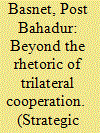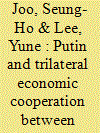|
|
|
Sort Order |
|
|
|
Items / Page
|
|
|
|
|
|
|
| Srl | Item |
| 1 |
ID:
123316


|
|
|
|
|
| Publication |
2013.
|
| Summary/Abstract |
Over the past few years, 'trilateral economic cooperation' and 'vibrant bridge' have become buzzwords in Nepal's foreign policy discourse, and have also caught the popular imagination at home in India. These proposals have generated both curiosity and anxiety in Delhi's diplomatic and academic circles that are otherwise largely indifferent to Nepal. The Chinese diplomats in Delhi also raising the issue with the Indian officials has added to India's anxiety all the more. With some notable exceptions (e.g., C. Raja Mohan, 'Three to Tango', The Indian Express, 7 May 2013), there is more or less consensus in India that such proposals from Nepal, if received formally, should be rejected outright, although some have prescribed the 'wait and see' approach as the best policy option for now. Moreover, the proposal has received prominence at a time when media reports about 'Chinese incursion into Ladakh' have flummoxed many policymakers in Delhi. While the Indian mandarins now seem to be handling the issue somewhat prudently, the supposed Chinese 'forward policy' across the Himalayas has already set alarm bells ringing, bringing back memories of the 'uncalled-for Chinese aggression' on India in 1962. It is in this context-'Chinese manoeuvres' across the Himalayas-that the rationale behind such plans in the changing dynamics of India-China-Nepal relations should be analysed.
|
|
|
|
|
|
|
|
|
|
|
|
|
|
|
|
| 2 |
ID:
157602


|
|
|
|
|
| Summary/Abstract |
Since 2000, President Vladimir Putin of Russia has persistently pushed for trilateral economic projects involving Moscow, Seoul, and Pyongyang, especially in the fields of energy (oil, gas, and electricity) and transportation (railroad). The Kremlin has long maintained that its proposed trilateral projects would not only be economically beneficial to all but also pave the road to inter-Korean reconciliation and peaceful unification. This article addresses three questions regarding Putin’s trilateral economic projects. What motivates Russia to push for the projects? Would they bring benefits to the three countries? Would they facilitate Korean peace process? The authors argue that Putin’s trilateral economic projects are part of Russia’s quest for power and search for a multipolar world order and should be understood from the theoretical framework of “structural realism.” The research finds that the projects are not feasible due to North Korea’s nuclear crisis and economic uncertainties and may be implemented after the current North Korea’s nuclear crisis is resolved diplomatically, if North Korea’s leadership changes or if inter-Korean reconciliation and cooperation is achieved by the progressive government of Moon Jae-In.
|
|
|
|
|
|
|
|
|
|
|
|
|
|
|
|
|
|
|
|
|